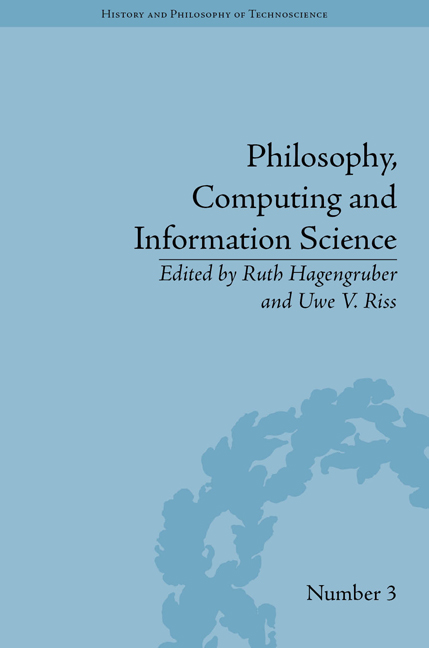Book contents
- Frontmatter
- CONTENTS
- List of Contributors
- List of Figures and Tables
- Introduction: Philosophy's Relevance in Computing and Information Science
- Part I Philosophy of Computing and Information
- Part II Complexity and System Theory
- 5 The Emergence of Self-Conscious Systems: From Symbolic AI to Embodied Robotics
- 6 Artificial Intelligence as a New Metaphysical Project
- Part III Ontology
- Part IV Knowledge Representation
- Part V Action Theory
- Part VI Info-Computationalism
- Part VII Ethics
- Notes
- Index
6 - Artificial Intelligence as a New Metaphysical Project
from Part II - Complexity and System Theory
- Frontmatter
- CONTENTS
- List of Contributors
- List of Figures and Tables
- Introduction: Philosophy's Relevance in Computing and Information Science
- Part I Philosophy of Computing and Information
- Part II Complexity and System Theory
- 5 The Emergence of Self-Conscious Systems: From Symbolic AI to Embodied Robotics
- 6 Artificial Intelligence as a New Metaphysical Project
- Part III Ontology
- Part IV Knowledge Representation
- Part V Action Theory
- Part VI Info-Computationalism
- Part VII Ethics
- Notes
- Index
Summary
Introduction
It has been a long-standing philosophical issue whether machines can think or not. In the history of philosophy, this issue is discussed using different types of questions such as ‘Is it possible to design intelligent artefacts?’, ‘Can a mechanistic performance of a machine imitate human intelligence?’ or ‘Can reasoning be reduced to some kind of calculation?’. The philosophy of artificial intelligence can be considered a modern aspect of these discussions. Artificial intelligence (hereafter AI) is a field of interdisciplinary study that lies at the intersection of cognitive science, linguistics, logic, neuroscience, computer science and psychology.
The definition and the goal of AI were specified in the middle of the twentieth century, and the study of AI has developed quickly in a very short period of time. These developments can be observed in certain branches of industry, medicine, education, the military, communication, game playing and translating. Such fields of application of AI comprise its technological aspect. AI also has a scientific aspect that deals with theoretical, methodological and conceptual questions, and the philosophy of AI deals with the latter.
The Definition and Aim of AI
What is AI? This is not an easy question, and it is not possible to find an exact definition accepted by all AI researchers. AI has various definitions. This variety is caused by divergent views with regard to the aim and scope of AI.
Information
- Type
- Chapter
- Information
- Philosophy, Computing and Information Science , pp. 67 - 74Publisher: Pickering & ChattoFirst published in: 2014
